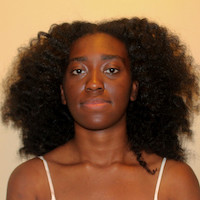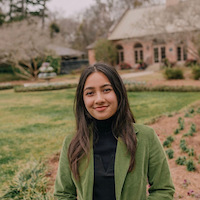The CONVERGE facility, headquartered at the Natural Hazards Center, is pleased to welcome two National Science Foundation Research Experience for Undergraduates (NSF-REU) participants during summer 2021: Niva Laurent from Scripps College and Amina Meselhe from Louisiana State University.
“We are so excited to host our first two NSF-REU students this summer,” Natural Hazards Center Director Lori Peek, who leads the CONVERGE initiative, said. “Our team will be offering research opportunities and mentoring support to Niva and Amina, and we look forward to learning from both of these incredibly bright students.”
 Niva Laurent, Scripps College
Niva Laurent, Scripps College
Niva Laurent is an undergraduate student at Scripps College. She is interested in interdisciplinary research related to disaster management, public policy, and environmental science. She said that she plans to double-major in a social science and a natural science in order to cultivate strong research skills to support her intellectual interests. Laurent previously worked as a research assistant at the University of South Florida, where she studied language and power in relationship to the 2019 Sharpiegate incident (in which former President Donald Trump put forth an image of Hurricane Dorian’s storm path that had been altered with a black marker). This summer, she will support Peek and others with analyzing data and promoting the efforts of the Social Science Extreme Events Research (SSEER) network.

Amina Meselhe, Louisiana State University
Amina Meselhe is an undergraduate civil engineering major at Louisiana State University (LSU). Meselhe said she hopes to create “proactive natural hazards preparedness and reactive response systems” using a multi-disciplinary approach. To that end, she has conducted research in several labs at LSU— including the Marine and Trophic Ecology Lab, the Geology and Geophysics Lab, and the Geotechnical and Civil Engineering Lab—to advance understanding of coastal erosion and waste management. As part of her NSF-REU experience, Meselhe will be supporting CONVERGE initiatives and collaborating on data curation efforts with the Structural Engineering Extreme Events Reconnaissance (StEER) network.
The opportunity to host Laurent and Meselhe was made possible through the broader Natural Hazards Engineering Research Infrastructure (NHERI) network, of which CONVERGE is a part. For the past five years, NHERI has funded about 30 undergraduate students from engineering and now includes students from the social sciences, as well.
The goal of the NSF-REU program is to meaningfully involve students in ongoing research programs or projects specifically designed for the REU program. Learn more about the program on the NSF website.